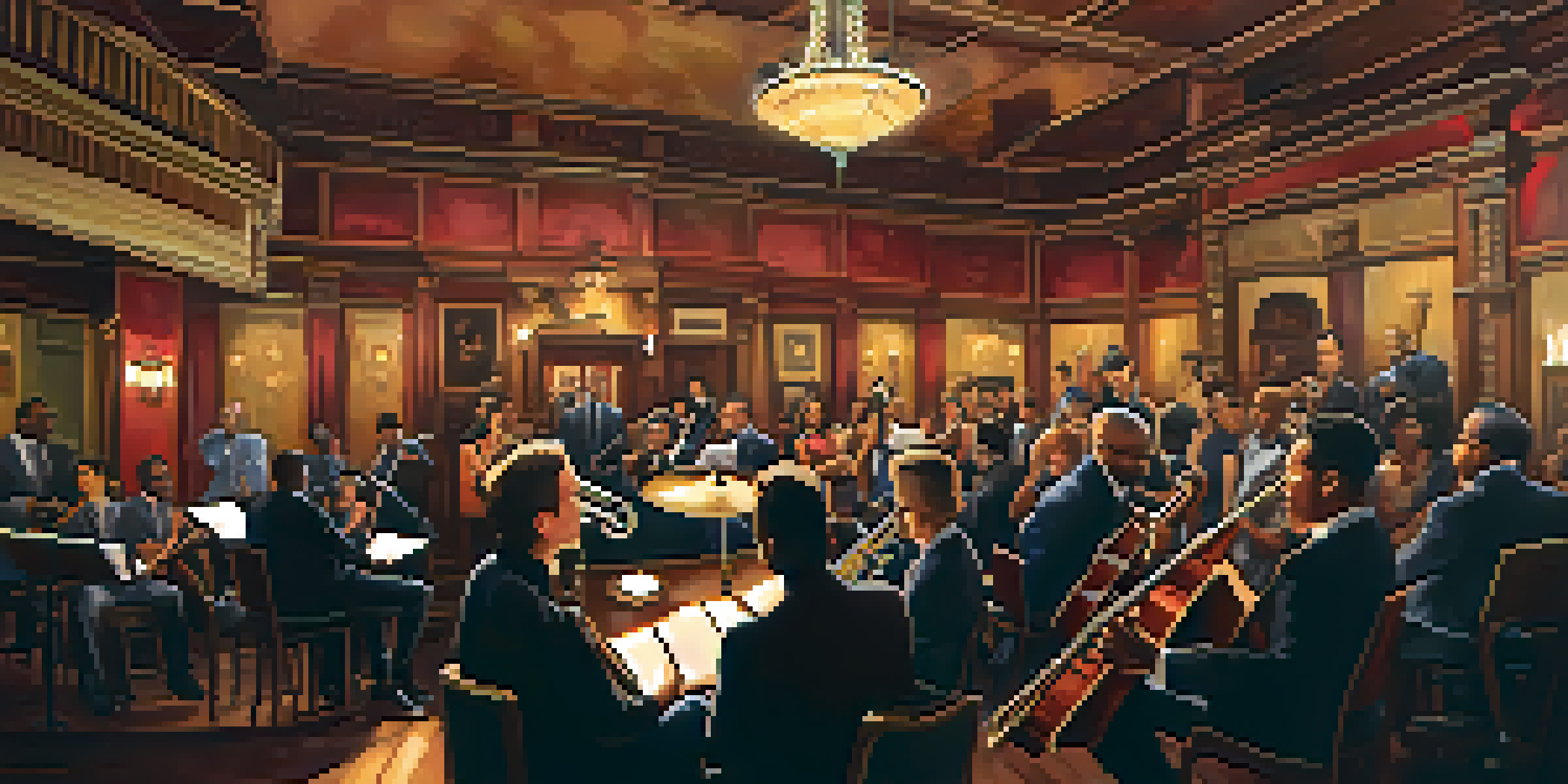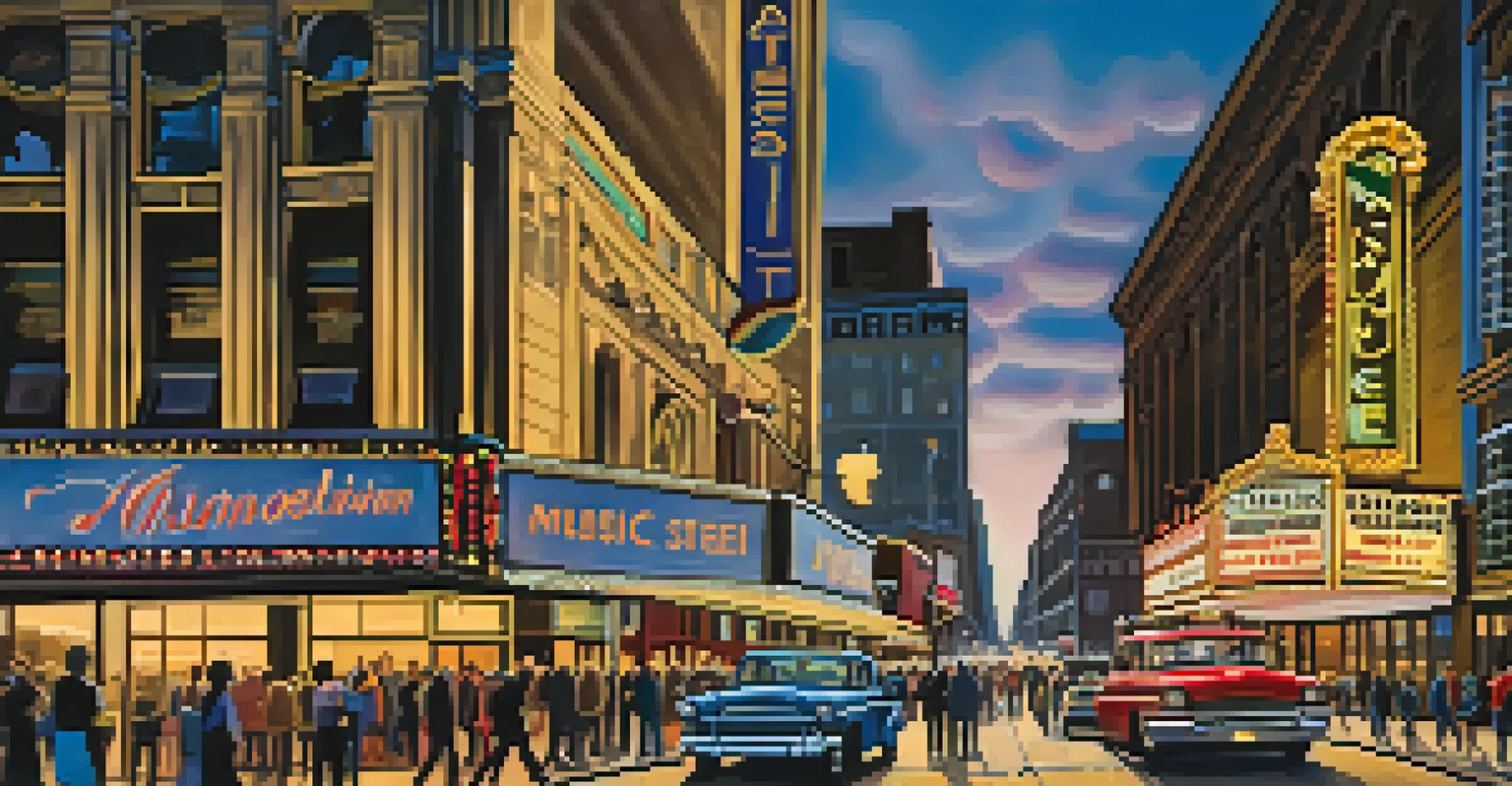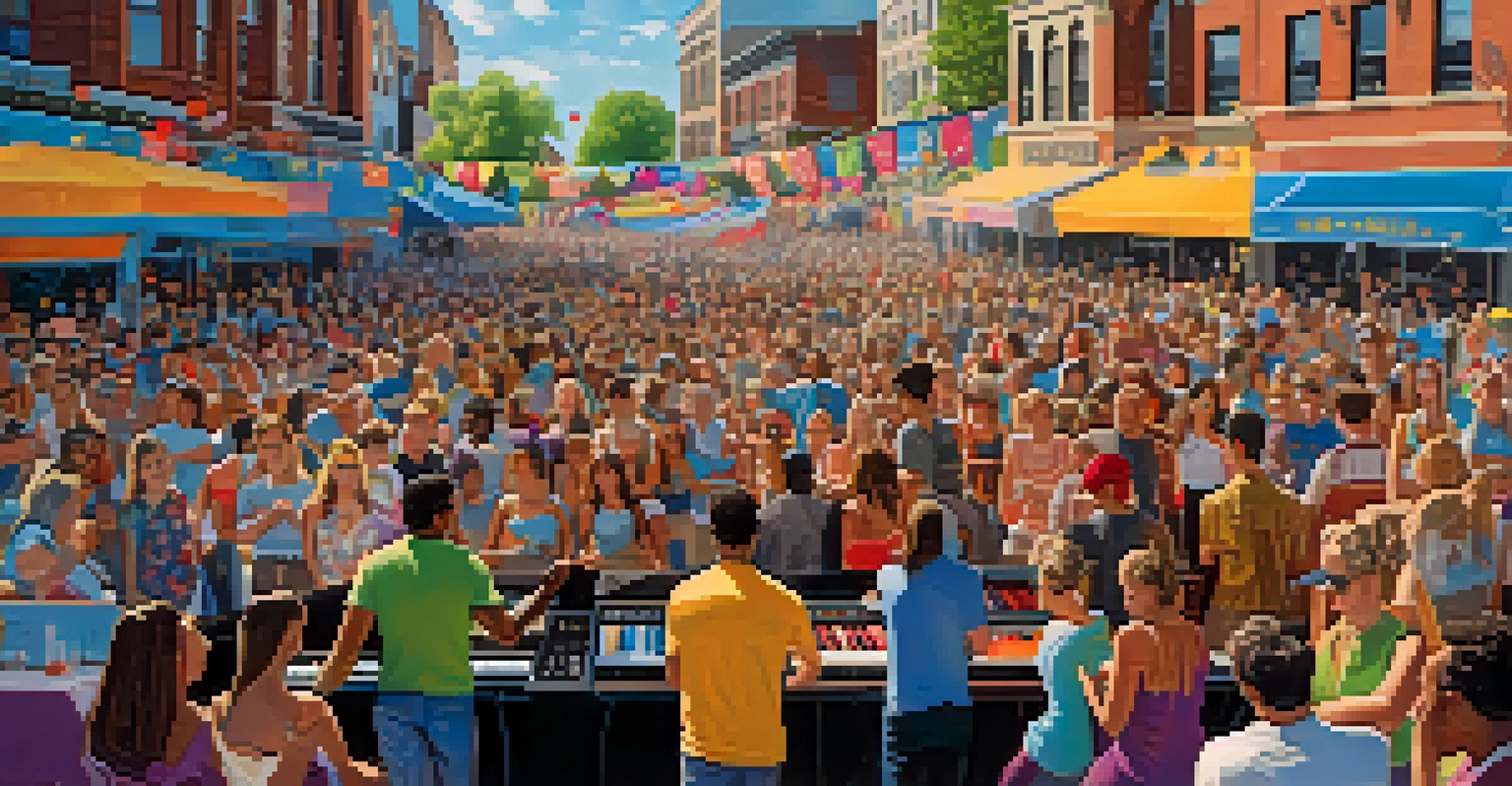Rochester's Musical Legacy: Influences Through the Decades

The Birth of Rochester's Music Scene in the 1900s
In the early 1900s, Rochester was a burgeoning hub for musical talent. The city embraced jazz and blues, influenced by the Great Migration, as African American musicians flocked to urban centers. Venues like the Auditorium Theatre became hotspots for live performances, showcasing local and national acts alike.
Without music, life would be a mistake.
This era laid the foundation for a vibrant music culture, with local legends emerging from the scene. Musicians began to experiment with new sounds and styles, creating a unique blend that would define Rochester’s identity. The rich, soulful rhythms of jazz intertwined with the raw energy of blues, captivating audiences across the city.
As the years progressed, Rochester's music scene continued to thrive, fostering a sense of community among artists and fans. Local radio stations began broadcasting these new sounds, further popularizing the music and giving artists a platform. This fertile ground for creativity set the stage for future musical developments.
The 1960s: A Time of Change and Innovation
The 1960s brought a wave of change to Rochester's music landscape, paralleling the cultural shifts happening across America. Rock and roll took center stage, with local bands emerging to capture the spirit of the times. Venues like the Eastman Theatre became iconic, hosting both emerging artists and established acts.

This decade also saw the rise of folk music, as artists began to use their platforms to address social issues. The blend of rock, folk, and the remnants of jazz created a rich tapestry of sound that resonated with many. It was a time when music became a voice for change, reflecting the hopes and struggles of a generation.
Rochester's Musical Evolution
From jazz and blues in the early 1900s to the diverse sounds of today, Rochester's music scene has continuously evolved, reflecting cultural shifts and artistic innovation.
Rochester was not just a spectator in this musical evolution; it played a significant role in it. Local festivals and concerts began to draw larger crowds, fostering a sense of unity among diverse groups. This spirit of innovation laid the groundwork for future genres and movements.
The 1970s and the Rise of Punk and Alternative
As the 1970s rolled in, Rochester's music scene began to embrace the raw energy of punk and alternative genres. Bands like The Chesterfield Kings emerged, showcasing a sound that was both rebellious and reflective of the times. The local bar scene became a breeding ground for these new styles, attracting a dedicated following.
Music is the universal language of mankind.
This era was characterized by a DIY ethos, with musicians often self-producing their work and organizing their own shows. This independence fostered a sense of community among artists, leading to collaborations that pushed musical boundaries. The underground scene thrived, and Rochester became known for its gritty, authentic sound.
Throughout the decade, the influence of punk and alternative music permeated local culture. The energy of live performances brought people together, creating a loyal fanbase. This period of creativity not only shaped Rochester's identity but also set the stage for future musical explorations.
The 1980s: A Fusion of Genres and Mainstream Success
The 1980s marked a significant evolution in Rochester's music scene, as genres began to blend and cross-pollinate. Synth-pop, new wave, and hip-hop emerged, showcasing a vibrant mix of sounds that reflected broader cultural trends. Local artists embraced these influences, pushing the boundaries of creativity.
During this time, Rochester saw the rise of bands like The Goo Goo Dolls, who would go on to achieve national success. Their blend of rock and pop resonated with audiences, highlighting the city's potential to produce mainstream talent. This success inspired a new generation of musicians to pursue their dreams.
Rise of Diverse Genres
The 1960s through the 2000s saw the emergence of various genres like rock, punk, hip-hop, and electronic music, showcasing the city's rich musical heritage and collaborative spirit.
Additionally, the growth of music festivals and events in Rochester during the 80s contributed to a thriving arts community. Concerts in the park and community gatherings became commonplace, creating spaces for artists to showcase their talents. This sense of camaraderie strengthened the bonds within the local music scene.
The 1990s: A Grunge and Hip-Hop Explosion
In the 1990s, Rochester's music scene experienced an explosion of grunge and hip-hop influences. Local bands tapped into the angst of the grunge movement, with raw vocals and heavy guitar riffs becoming staples of the time. Venues like the Water Street Music Hall became crucial for live performances, attracting artists from various genres.
Simultaneously, Rochester's hip-hop scene began to flourish, with artists blending poetry and rhythm to convey powerful messages. This fusion of genres showcased the city's diverse musical heritage, as artists from different backgrounds collaborated and created something entirely new. The vibrancy of this era left a lasting impact on the community.
The mix of grunge and hip-hop not only enriched Rochester's soundscape but also attracted new audiences. Fans from various demographics came together to celebrate the music, fostering a sense of unity. This decade marked a pivotal moment in the city’s musical identity, reflecting both local and national trends.
The 2000s: Embracing Diversity and New Technologies
The 2000s brought about a new wave of musical experimentation in Rochester, fueled by advancements in technology and a growing diversity of influences. The rise of digital music production allowed artists to explore new sounds and reach wider audiences. Local musicians began to blend genres like electronic, indie, and pop, creating innovative and eclectic sounds.
Open mic nights and community events flourished, encouraging collaboration among artists. This period saw the emergence of various music festivals, celebrating everything from indie rock to hip-hop. The city became a melting pot of sounds, where musicians from different backgrounds came together to share their art.
Support for Emerging Artists
Today, Rochester nurtures its musical talent through local initiatives and vibrant community support, ensuring a thriving environment for artists across all genres.
As social media and streaming platforms gained popularity, Rochester's artists found new ways to connect with fans. This accessibility opened doors for many local musicians, allowing them to showcase their work beyond the city limits. The 2000s truly marked a turning point in how music was created and consumed in Rochester.
Rochester Today: A Thriving Music Hub
Today, Rochester stands as a thriving music hub, rich with diverse influences that reflect its storied past. The city is home to numerous music festivals, local venues, and a vibrant community of artists. From jazz and blues to indie rock and hip-hop, the musical landscape continues to evolve.
Local initiatives and organizations support emerging artists, providing resources and platforms for creative expression. The revival of historic venues and the opening of new ones further enrich the music scene, creating spaces for collaboration and performance. Rochester's commitment to nurturing its musical talent is evident in the strength of its community.

As we look to the future, Rochester’s musical legacy will undoubtedly continue to shape and inspire new generations of artists. The city's rich history serves as a foundation for innovation, ensuring that the spirit of creativity remains alive. Rochester's music scene is not just a relic of the past; it's a vibrant, living tapestry of sound.